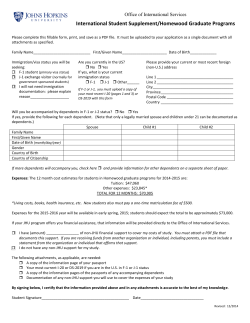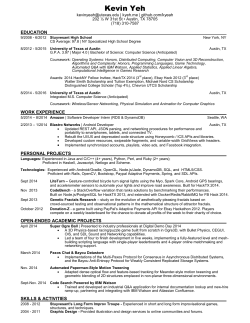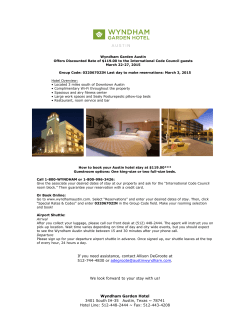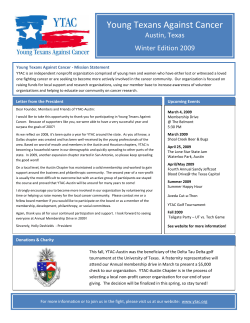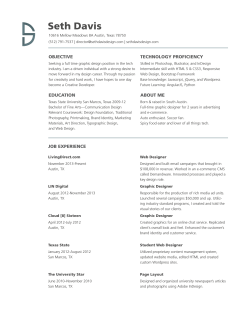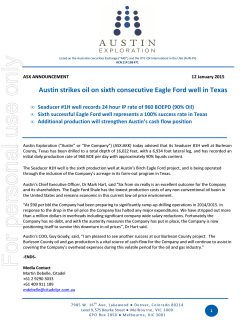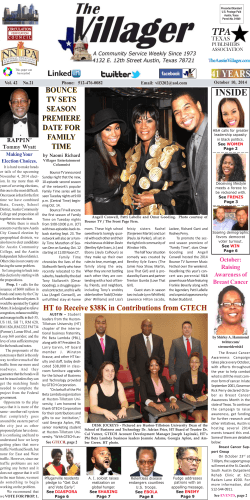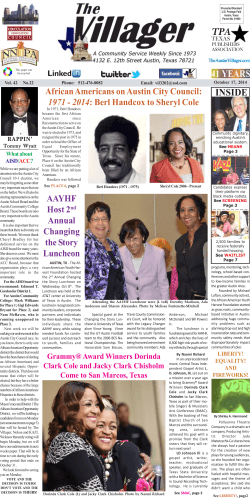
J-1 Scholar Pre-Arrival Guide
J-1SCHOLAR PRE-ARRIVAL GUIDE WORLD.UTEXAS.EDU/ISSS TABLE OF CONTENTS 2............................ Pre-Arrival Checklist 2............................ SEVIS Fee 3............................ Applying for a J-1 Visa 3............................ Program Dates & Activity 3............................ Maximum Stay 4............................ Entering the United States 4............................ Arrival Information 5............................ Mandatory J-1 Scholar Orientation 6............................ J-1 Program & Key Definitions 7............................ 212(e) Two-Year Home Residence Requirement 7............................ Repeat Participation Bars 8............................ Medical Insurance Requirements 9................. UT Austin Employee Medical Insurance 9................. Foreign Medical Insurance Plans 10.......................... University Student Health Insurance Plan 10.......................... University Health Services 11........................... Tax Information & Social Security Numbers 12........................... Living in Austin 12............... Housing Information 13............... Living Expenses 14............... Public Schools & Child Care 14............... Choosing Quality Child Care 15.......................... Getting Involved 16-17.................... Campus Map WELCOME We are glad that you chose The University of Texas at Austin (UT Austin) for your J-1 Exchange Visitor Program and look forward to welcoming you to Austin. At International Student and Scholar Services (ISSS), we are here to help you with immigration planning and related matters during your stay. This J-1 Faculty & Scholar Pre-Arrival Guide contains essential information about immigration regulations, programs and services for new international faculty and scholars. Whether you are coming to UT Austin from your home country or from another U.S. university, please read this guide carefully. Austin is situated on the banks of the Colorado River in the heart of central Texas known as the Hill Country. Rolling hills dotted with lakes and streams provide a beautiful setting for the downtown capital area and The University of Texas at Austin. The Capitol Building, the UT Tower and downtown office buildings create a skyline that reflects the city itself – a center for education, government and commerce. Austin features a pleasant climate and a wealth of outdoor settings for swimming, cycling, hiking and other activities. Summer days are humid and often reach temperatures above 97 degrees Fahrenheit (36 degrees Celsius). Winter days may fall below freezing. Visitors will need light cottons for summer and warm jackets for winter. Austin is also known for its variety of artistic venues, which feature live music, performance and artistic exhibitions. Austin is only a short drive from San Antonio, Houston and Dallas, which are all centers for cultural and touring performances, as well as major sporting events. CONTACT INFORMATION International Student and Scholar Services International Office The University of Texas at Austin Telephone: 512-471-2477 Fax: 512-471-8848 [email protected] world.utexas.edu/isss/scholars Individual advising by online appointment: Monday & Friday: 9:00am-11:30am Tuesday & Thursday: 1:30pm-3:00pm Mandatory J-1 Scholar Orientation by online appointment: Monday & Wednesday: 2:00-3:00pm 1 PRE-ARRIVAL CHECKLIST / SEVIS FEE PRE-ARRIVAL CHECKLIST SEVIS FEE Carefully read all of the information in this J-1 Faculty & Scholar Pre-Arrival Guide. All J-1 visa applicants must pay the SEVIS fee of $180. The SEVIS fee must be paid at least three business days before the scheduled visa application interview. For most individuals, the SEVIS fee can be paid by electronically completing the Form I-901 and paying with a credit card at www.fmjfee.com/i901fee. You will need the information from your DS-2019 in order to complete the SEVIS Fee payment. Before arriving, you must: • Verify that all if the information on your DS-2019 is correct. Note the program begin date and notify your inviting department (and ISSS) immediately if your travel plans change, including if you face delays in getting your visa • Pay the SEVIS FEE online at www.fmjfee.com/i901fee • Apply for a J-1 Visa at the nearest U.S. Consulate or Embassy to your home residence • Schedule your mandatory J-1 Scholar Orientation with ISSS for a date shortly after your arrival in Austin. Appointments can be made at: world.utexas.edu/isss/scholars • Arrange or make plans for transportation from the Austin airport to your hotel or apartment • Purchase or make plans for required medical insurance coverage. The U.S. Department of State requires all individuals who enter the United States in J-1 status to have medical insurance for themselves and any accompanying J-2 dependents • Arrange or make plans for your housing needs. Although ISSS is unable to assist you in arranging housing, this guide provides an overview of the many housing choices in Austin. Print the electronic receipt immediately at the time of payment. You must show the receipt to the consular officer at the time of the interview. Spouses and dependent children (J-2s) do not pay this fee. The SEVIS fee is not a visa application fee. It is used to operate and maintain the SEVIS system. The fee is nonrefundable, even if the visa application is denied. NOTE Canadian nationals are exempt from the J-1 Visa requirement. However, they must pay the $180 SEVIS fee. 2 APPLYING FOR A J-1/J-2 VISA APPLYING FOR A J-1/J-2 VISA • Proof of ties to your home country Consult the website of your local U.S. Consulate/Embassy for suggestions A valid J-1 visa is required for entry to the United States on the Exchange Visitor Program. For information on processing times and procedures, visit the U.S. Department of State at travel.state.gov/content/visas/english/studyexchange/exchange.html. • Proof of financial support - You must be able to verify the total funds indicated on the DS-2019 with a personal bank statement and/or a sponsor’s official statement of support. If you are receiving payment from UT Austin, you may request a letter from the inviting department that specifies your position and salary. • Two U.S. Passport-size Photos (often required – check with U.S. Consulate), for each visa applicant • J-1 Invitation letter from the sponsoring department at The University of Texas at Austin (recommended) • Evidence of J-2 relationship to the J-1 applicant (e.g. marriage or birth certificate) NOTE A personal interview is required, so you will need to schedule your appointment as soon as possible. Be aware that there could also be substantial delays due to security checks, so please plan your travel arrangements accordingly. Immediate family members (spouse and children under the age of 21) who will accompany you to the U.S. may apply for J-2 visas using the DS-2019 forms enclosed. If your family will join you later, a DS-2019 form will be issued by ISSS upon request. PROGRAM DATES AND ACTIVITY Applying for a J-1 visa using the enclosed DS-2019 implies acceptance of the terms and conditions outlined on the second page of the form. You may be admitted to the United States to engage in the activity described in item 4 of the form and for the period of time specified in item 3. The following is generally required for the consular J-1/J-2 visa application: • Signed DS-2019(s) – A separate DS-2019 form is required for each visa applicant. Each J visa applicant should sign his/ her own DS-2019, with the exception of children under age 14 (the J-1 parent should sign in this instance). The DS-2019(s) will be returned to you to present at the U.S. port of entry. • Receipt showing payment of the $180 SEVIS fee (J-1 only) • Payment of the $160 visa application fee, and appropriate visa application forms (see usembassy.gov), for each visa applicant • Passport(s) valid for at least 6 months into the future, for each visa applicant MAXIMUM STAY The category indicated in item 4 of your DS-2019 determines your maximum period of stay under your J-1 program. See the second page of the DS-2019, 1(c) “Limitations of Stay.” Upon completion of your J-1 program, you are afforded a 30-day grace period to prepare for departure from the United States. You should not work or engage in other program activities during this period. 3 ENTERING THE UNITED STATES / ARRIVAL INFORMATION ENTERING THE UNITED STATES ARRIVAL INFORMATION The local Austin airport is called Austin Bergstrom International Airport (ABIA) and is located approximately 15 miles (24 kilometers) from the UT Austin campus. Present the following documents to the U.S. Customs and Border Protection (CBP) Officer at the U.S. port of entry: • • • Passport(s) containing a valid J-1 visa (or J-2 visas for accompanying family members) Signed DS-2019(s) for you and any accompanying family members Recommended: Proof of financial support (same as the document presented at the U.S. Embassy or Consulate) and invitation letter from the sponsoring department at UT Austin NOTE If you arrive on a Saturday or Sunday, the university and many businesses will be closed, so please plan accordingly. Transportation options from ABIA to campus include: The officer should return the following: • Passport(s) with entry stamp: Please check that the entry stamp has the notation “J-1 D/S” or “J-2 D/S” (D/S stands for “duration of status). If you notice a discrepancy, please be sure to address it with the CBP officer immediately as it may be difficult to correct later. • Stamped DS-2019s for you and any accompanying family members. • Any of the recommended documents that you provided. BUS Capital Metro, the city bus line in Austin, operates the Route #100 Airport Flyer, which departs the airport every 40 minutes and provides transportation to downtown Austin and the UT Austin campus (26th and Speedway). The fare is currently $1.00. For a complete bus route and schedule, please visit: www.capmetro.org. You can also call Capital Metro’s “Go Line” at 512-474-1200 when you arrive in Austin for information on the next scheduled bus departure from the airport. I-94 RECORDS Under the current system, your I-94 entry record will be available to you by accessing the following website online: i94.cbp.dhs.gov/I94/request.html. Occasionally, a paper I-94 is issued at the U.S. Port of Entry. SUPERSHUTTLE This company provides airport transportation in the form of shared vans. To get to the UT Austin campus, you should plan to pay an approximately $14 fare for one passenger and $10 for each additional passenger. To make a reservation, call 1-800-258-3826 or visit www.supershuttle.com. CANADIAN NATIONALS Canadian nationals are not required to obtain a visa stamp from the U.S. Embassy or Consulate. However, they must present the enclosed DS2019, SEVIS fee receipt, and a Canadian passport at the U.S. port of entry in order to be admitted in J-1 status for D/S (duration of stay). If you are a Canadian Landed Immigrant, please check with the nearest U.S. Consulate about whether or not you require a J-1 visa stamp, as requirements vary depending on country of citizenship. TAXI You should plan to pay an approximate fare of $25 to the UT Austin campus. In most cases, you do not need to arrange a taxi in advance, but costs may vary between taxi companies. NEXT STEPS UPON ARRIVAL Inform your inviting department that you have arrived safely. Attend the mandatory J-1 Scholar Orientation at ISSS (more on pg.5). 4 MANDATORY J-1 SCHOLAR ORIENTATION MANDATORY J-1 SCHOLAR ORIENTATION WHAT TO BRING You will need to bring the following documents to your orientation session for you and any accompanying J-2 dependents: OVERVIEW The U.S. Department of State requires us, as your program sponsor, to provide you with an orientation program. After you attend the orientation, an International Faculty & Scholar Advisor will validate your arrival in the Student and Exchange Visitor Information System (SEVIS) database. This validation notifies the Department of Homeland Security that you have arrived and begun your J-1 exchange visitor program and changes your SEVIS record to “ACTIVE” status. • • • • • Passport(s) I-94 Arrival/Departure Record records(s) DS-2019(s) Proof of insurance Completed Arrival Information Form, including: • Local U.S. Address • Emergency Contact information TOPICS COVERED AT ORIENTATION • Immigration status • Medical and evacuation/repatriation insurance, and University Health Services • Employment • U.S. tax information • Obtaining a Texas Driver’s License, University Identification card (UT ID), and U.S. Social Security Number • Intercultural and family programs • Local transportation and shopping options to consider • Services provided by ISSS Failure to attend orientation and have your SEVIS record validated may result in future immigration complications as well as problems obtaining a Social Security Number. DAYS AND TIME Please attend the J-1 Scholar Orientation as soon as possible after you arrive in Austin. Orientation sessions are held Mondays and Wednesdays at 2:00 pm and typically last about one hour. To view the available orientation sessions and schedule your web appointment, please visit: world.utexas.edu/isss/scholars. We conduct orientation in a group setting, so please be on time for your appointment and have all of your documents with you (noted in the next section). If you arrive after orientation has started, you will be asked to reschedule for another session. NOTE Your J-2 dependent family members are welcome to attend the orientation with you if space permits; however, the J-1 Faculty/Scholar is the only one who is required to attend. If your family members do not accompany you to orientation, please remember to bring their documents and insurance for verification. 5 J-1 PROGRAM AND KEY DEFINITIONS J-1 PROGRAM AND KEY DEFINITIONS RESPONSIBLE OFFICERS Sponsors appoint individuals as Responsible Officers and Alternate Responsible Officers to advise and assist Exchange Visitors. These officers have authority to issue the Certificate of Eligibility (DS-2019) to Exchange Visitors and communicate with the Department of State and the Department of Homeland Security on your behalf. The following information is provided by the U.S. Department of State. We include it in this guide according to the Department of State’s requirements for J-1 Program Sponsors. The U.S. Department of State administers the Mutual Educational and Cultural Exchange Act of 1961, as amended. The Act promotes mutual understanding between the people of the United States and other countries by means of educational and cultural exchange. The Exchange Visitor Program provides foreign nationals with opportunities to participate in exchange programs in the United States and then return home to share their experiences. RULES AND REGULATIONS You must understand and abide by the Exchange Visitor Program regulations, U.S. laws, and sponsor rules. Regular contact with your Responsible Officer will help you keep current of any changes, which may affect your J status. ACTIVITIES & PROGRAM PROVISIONS You will enter the United States in one program category and will be required to engage in that category and subject/field of activity listed on your DS-2019. You must comply with the specific program provisions of the regulations relating to your program category. SPONSORS The U.S. Department of State designates sponsors to administer individual Exchange Visitor programs. Sponsors are U.S. organizations such as government agencies, academic institutions, educational and cultural organizations, and corporations. They screen and select Exchange Visitors participating in their programs, provide them with pre-arrival information and an orientation, and monitor their activities. Sponsors offer Exchange Visitors cross-cultural activities that will expose them to American society, culture, and institutions. Exchange Visitors are encouraged to participate in activities that provide them with an opportunity to share their language, culture, and history with others. MAINTENANCE OF STATUS You are required to have a valid and unexpired DS-2019. Sponsors may terminate an Exchange Visitor’s program for violating U.S. laws, Exchange Visitor Program regulations, or the sponsor’s rules governing their particular program. NOTIFICATION You must inform your Responsible Officer if you change your address or telephone number, or complete or withdraw from your program early. Doing so assists your sponsor in reporting current information to the U.S. Department of State. EXCHANGE VISITORS An Exchange Visitor is a foreign national selected by a sponsor to participate in an exchange program, and is issued a DS-2019 to apply for a J-1 visa. An accompanying spouse and any unmarried children under 21 years of age may apply for J-2 visas, with the permission of your sponsor. CONTACT INFORMATION U.S. Department of State Bureau of Educational and Cultural Affairs Office of Exchange Coordination and Designation 301 Fourth Street, SW Room 734 Washington, DC 20547 6 HOME RESIDENCE REQUIREMENT / PARTICIPATION BARS 212(E) TWO-YEAR HOME RESIDENCE REQUIREMENT REPEAT PARTICIPATION BARS Exchange Visitors and their dependents may be subject to the 212(e) Two-Year Home Residence Requirement. This requirement is different from the 12-month and 24-month repeat participation bars. Please read and understand section 1(a) on the second page of the enclosed DS-2019. 12-MONTH BAR USCIS regulation 22 CFR 62.20(d)(ii) established a “12-month bar” on beginning a new J-1 program as a Research Scholar or Professor for those persons who spent the previous year in the United States in any J status (J-1 or J- 2). This bar does not apply to transfers from one institution to another, to persons who were Short-Term Scholars, or to persons whose J program lasted less than six months. This requirement is normally associated with government funding (from your country or the United States) and/or the U.S. Department of State skills list. To see if your country and skill results in this requirement, please check the skills list at: travel.state.gov/content/visas/english/studyexchange/exchange/exchange-visitor-skills-list. html. 24-MONTH BAR USCIS regulation 22 CFR 62.20(i)(2) established a “24-month bar” on repeat participation as a Research Scholar or Professor for those persons were present in the United States in J-1 Research Scholar/Professor Category on or after November 17, 2006. The bar does not apply to transfers from one institution to another. If you are subject to 212(e), it does not mean that you cannot return to the United States for two years in any nonimmigrant status, (i.e., F student or B tourist). However, it does mean that you cannot change status in the United States or obtain a work visa (H), permanent residency (green card) or an intra-company transferee visa (L) unless this requirement is waived or met. These bars only prevent new programs as Research Scholars and Professors who have previously held J status. They do not prevent someone who has held J status from beginning a new program as a J-1 Student or Short-Term Scholar. Once the applicable 12-month or 24-month time period has lapsed, Exchange Visitors are again eligible to begin a program in any J category. For more information on the Two-Year Home Residence Requirement, please see our website at world.utexas.edu/io/forms/isss/waiver-ofHRR.pdf. The Consular Officer may indicate this requirement on your visa or DS-2019; however, the Department of State Exchange Visitor Program makes the final determination on whether this requirement applies. NOTE If you held J status within the last year or believe that one of these bars might apply to you, please contact your Faculty and Scholar Advisor at ISSS for possible alternative options for visiting The University of Texas at Austin. 7 MEDICAL INSURANCE MEDICAL INSURANCE REQUIREMENTS NOTE It is the J-1 Exchange Visitor’s responsibility to notify ISSS of dependents who are currently in the United States or who arrive later and present evidence of appropriate insurance coverage for them. U.S. Department of State regulations require all J-1 Exchange Visitors to have medical insurance for themselves and any accompanying J-2 family members for the duration of their program. In addition, J-1 Exchange visitors and their J-2 dependants may be subject to the requirements of the Affordable Care Act. You are required to purchase an insurance policy for the entire duration of your program (as indicated on your DS-2019) if your program’s duration is less than one semester. If your program will continue for more than one semester, you may purchase insurance for first semester only and renew your policy in semesterly increments. It is your responsibility to provide proof of continuous insurance coverage to ISSS. Willful violation of the insurance requirements can result in termination of your J-1 program by ISSS, in accordance with immigration regulations. Fulfilling this insurance requirement is essential, not only because of the U.S. Department of State regulations, but because medical treatment in the United States can be very expensive, especially without proper insurance coverage. YOUR INSURANCE MUST MEET THE FOLLOWING REQUIREMENTS: COVERAGE CURRENT REQUIREMENT NEW REQUIREMENT (AS OF MAY 15, 2015) Medical Benefits $50,000 $100,000 Medical Evacuation $10,000 $50,000 Repatriation of Remains $7,500 $25,000 Deductible per accident or illness $500 $500 8 MEDICAL INSURANCE UT AUSTIN EMPLOYEE MEDICAL INSURANCE three days of orientation if you have not already purchased it in your home country. Please ask a Faculty and Scholar Advisor for more information during orientation if you need to purchase this supplemental insurance. If you will be employed by UT Austin for at least 20 hours per week and for a duration of at least 4.5 months during your J-1 program, your medical insurance coverage may be provided to you as a benefit of your employment, according to the following guidelines: EXCHANGE VISITORS NOT INSURED AS UT AUSTIN EMPLOYEES J-1 Exchange Visitors who receive all of their funding from a source outside of UT Austin, or who are appointed at UT Austin for less than 20 hours per week and/or less than 4.5 months, are not eligible for medical coverage provided by UT Employee insurance. These Exchange Visitors must purchase insurance from their home country, a private insurance company, or through ISSS. Full-time Employees - All full-time (40 hours) benefits-eligible employees have insurance coverage from their first day of employment. Full-time employees have 31 days from their date of hire to elect optional benefits or add dependents. Part-time Employees - All part-time (20-39 hours) benefits-eligible employees and their covered dependents must elect insurance coverage within 31 days from their date of hire or they will not have any insurance coverage. FOREIGN MEDICAL INSURANCE POLICIES J-1/J-2 Exchange Visitors who will be covered within the United States under a foreign insurance policy must plan to submit a copy of the insurance policy to ISSS. You must submit an English translation of your policy that clearly demonstrates that the policy meets the minimum requirements outlined in this guide. Individuals carrying policies that do not meet the minimum levels of coverage will be required to purchase insurance that meets the U.S. Department of State requirements, including medical evacuation and repatriation coverage. NOTE Please consult with your hiring department regarding your eligibility for insurance benefits as a UT Austin employee. NEW EMPLOYEE ORIENTATION FOR BENEFITS-ELIGIBLE EMPLOYEES If you will receive insurance benefits from UT Austin due to your employment, you will need to attend a new employee orientation to elect your insurance coverage. New employee orientation is presented by Human Resource Services (HRS), and requires pre-registration. More information on the available times and location of the orientation are available online at www.utexas.edu/hr/current/new/newo.html. PREGNANCY AND INSURANCE COVERAGE Please know that many international/travel plans will not cover pregnancy expenses, or may exclude pre-existing pregnancies. If you or your spouse is currently pregnant and you are not eligible for UT Employee medical insurance, you should be careful to purchase a medical insurance policy that will cover the pregnancy and birth while you are in the United States. Both the UT employee and UT student health insurance plans will cover a pre-existing pregnancy. If you are eligible for UT employee medical insurance and you or your spouse is currently pregnant, please contact Human Resource Services (HRS) as soon as possible. SUPPLEMENTARY INSURANCE COVERAGE UT Austin Employee medical insurance does not include repatriation and medical evacuation coverage. You must purchase supplemental coverage for these two requirements within 9 MEDICAL INSURANCE VISION AND DENTAL CARE It is important to remember that in the United States certain kinds of elective medical care, such as eyeglasses or dentistry, are ordinarily not covered by regular medical insurance. Exchange Visitors should take care of such needs before leaving home, or may elect to purchase separate coverage for these needs through a private company. The University Student Health Insurance Plan covers sickness, injury, preventative care, and prescription expenses. All covered individual will need to pay a portion of medical expenses out of pocket. For detailed benefit information, please visit utexas.myahpcare.com/benefits. UNIVERSITY HEALTH SERVICES (UHS) UNIVERSITY STUDENT HEALTH INSURANCE PLAN Visiting scholars may use the University Health Services on-campus clinic for a subscription fee of $100.00 per semester. After paying the $100.00 subscription fee, you will be charged for medical services at UHS according to your insurance plan’s contract. For holders of the University Student Health Insurance Plan, UHS services are covered at 100%. Please note that UHS cannot bill international/travel insurance directly. If you hold an international/travel insurance plan, you will need to pay UHS up front, then file a claim for reimbursement from your insurance company. For more information about UHS, visit www.utexas.edu/student/health. UHS is only available to the J-1 Exchange Visitor and not to J-2 dependent family members. J-1 Exchange Visitors are eligible for enrollment in the University Student Health Insurance Plan, which satisfies all U.S. Department of State Insurance requirements for the J-1 program. Detailed information about this year’s current insurance plan is available at world.utexas.edu/isss/insurance/vs-uhcsr. To purchase this plan or to have more detailed questions answered, you can make an appointment with our Insurance Advisor or email [email protected]. 10 TAX INFORMATION / SOCIAL SECURITY NUMBERS TAX INFORMATION TAX FILING RESPONSIBILITIES & ASSISTANCE If you are in the United States for even a day in J-1/J-2 status, you will have tax filing responsibilities during tax filing season (February through April). If you did not have any U.S. source income, you are still required to file Form 8843 with the Internal Revenue Service (IRS). Your J-2 dependents must also file Form 8843. If you have U.S. source income, you may also be required to file a tax return. Although ISSS cannot assist you with preparing your taxes during normal office hours, volunteer tax assistance is available by appointment during tax filing season. J-1 Exchange Visitors at UT Austin are also eligible to use GLACIER tax preparation software that is available through ISSS. For more information, please consult our tax website at world.utexas.edu/isss/tax. As in most countries, the tax laws in the United States are very complicated. Tax treaty benefits, Social Security taxes, and filing requirements depend on your visa status, the purpose of your visit, the number of days you will be in the United States, and the history of prior visits. NOTE J-2 dependants with work authorization are fully subject to Federal, Social Security, and Medicare taxes and are not eligible for tax treaty benefits. TAXATION OF EXCHANGE VISITORS It is hard to generalize about specific tax situations. Under normal circumstances, visitors in J-1 status do not pay Social Security or Medicare taxes until they have been in the United States for two calendar years. However, U.S. source income is normally subject to federal income tax withholding at a 10-14% rate, or at a 30% rate for one-time payments for independent contractor services. If your country has a Tax Treaty with the United States, a portion of your income is generally exempt from tax withholding for a certain period of time specified by the treaty. SOCIAL SECURITY NUMBERS A Social Security Number (SSN) is required in order to be paid in the United States. Instructions on the SSN application procedure are available from ISSS. You must wait 10 days after your arrival to the United States and be validated in the SEVIS system in order to apply for an SSN, so please plan accordingly. Your J-1 status will be validated in the SEVIS system within 3-4 days of your attendance at the mandatory J-1 Scholar Orientation. NOTE If you have an SSN from a past visit to the United States, you will use the same number for your entire lifetime. 11 LIVING IN AUSTIN HOUSING INFORMATION APARTMENTS/APARTMENT LOCATOR SERVICE Many J-1 faculty and scholars live in privately owned apartments within walking distance of campus or on the UT shuttle or city bus routes. Depending on the apartment complex, you may be able to rent an apartment before you arrive in Austin or in person upon your arrival. The following information may be helpful to you in finding housing in Austin. You may also want to contact your sponsoring department to see if they are able to provide housing assistance to you. Unfortunately, there is no temporary oncampus housing available for exchange visitors. We suggest that you consider a plan for living in a hotel for the first few days after your arrival, until you are able to find housing that suits your needs. A list of apartment locators is provided if you need assistance with finding housing. There is no fee for using an apartment locator service. HOTELS (in order of proximity to UT campus) • Doubletree Club Hotel: 1617 N. IH35 & MLK, Tel. 512-479-4000, www.doubletree.com, $80-120/night • Rodeway Inn: 2900 N. IH 35, Tel. 512-477-6395, www.rodewayinn.com, $60-76/night • Days Inn University: 3105 N. IH 35, Tel. 512-478-1631 or 1-800-725-7666, www.daysinn.com, $55-75/night • Doubletree Guest Suites: 303 W. 15th, Tel. 512-478-7000 www.doubletree.com, $100-175/night • LaQuinta Inn: 5812 N. IH 35 (car needed) Tel. 512-459-4381, www.laquinta.com, $70-80/night • Motel 6 Austin Central-South: 5330 N. IH 35 (car needed), Tel. 512-467-9111 www.motel6.com, $39-50/night • Hostelling International: 2200 S. Lakeshore Blvd. (on bus route), Tel. 512-444-2294 www.hiaustin.org, $19-52/night APARTMENT LOCATOR SERVICES: • Apartment Finders: Tel. 512-322-9556; 1-800-711-0498, www.ausapt.com • Habitat Hunters: Tel. 512-482-8651, www.habitathunters.com • Properties One: Tel. 512-836-0727, www.prop1.com • Property Management of Texas: Tel. 512-476-2673, [email protected] FULL SERVICE HOUSING PLACEMENT (FEE CHARGED): • Simply International www.simplyinternational.com UT HOUSING RESOURCES: TIPS TO FINDING HOUSING: • International Office housing resources: world.utexas.edu/io/forms/isss/ housing-information-resources.pdf • Check the “Classified” Section of The Daily Texan or Austin American Statesman • Office of the Executive Vice President and Provost Housing Guide: www.utexas.edu/provost/housing/ resource. • Check the housing section at austin.craigslist.org • Walk or drive around neighborhoods near campus looking for “For Rent” or “For Lease” signs 12 LIVING IN AUSTIN RENTING A HOUSE You may want to consider renting a home available from a staff or faculty member who is temporarily absent from the university. To view a list of available rentals, see www.utexas.edu/provost/housing (Note: UT EID is required to log into this website). Please keep in mind that faculty housing is very limited and available spaces will vary, depending on the time of year you visit. ROOMMATES A person living alone in an apartment may spend an average of $1,200 or more per month for rent, utility bills, and food. Sharing an apartment with a roommate can significantly lower these costs and can help international visitors practice speaking English and learn about United States culture. LIVING EXPENSES Depending on your lifestyle, living expenses in Austin range from $1,425 to $1,800 per month or higher. The estimate of $1,425 per month is for a single visitor with a very frugal lifestyle. Visitors with dependents should be prepared for increased living expenses - at least $725 per month for your spouse and $300 per month more for each child. Please consider the following factors (plus any individual needs) while preparing for your expenses as an Exchange Visitor at UT Austin: 13 • In Austin, you can expect to pay a minimum of $950 per month for a onebedroom apartment. The legal occupancy limit for a one-bedroom apartment is 2 people; thus, a family of three would only be eligible for a two-bedroom apartment. • You will need to purchase medical insurance for yourself and any accompanying family members if you are ineligible for UT Employee Medical Insurance or another qualifying insurance plan. Supplemental insurance to cover medical evacuation and repatriation is also required for you and your family during your entire J-1 program. • You may not accept employment that is unrelated to the objective of your Exchange Visitor Program. Therefore, you should not expect to obtain U.S. funding in excess of that indicated on the enclosed DS-2019. • If your funding is coming from UT Austin, there may be a delay of up to one month before your first paycheck is received. Visitors are advised to arrive with at least $3,000 to cover initial expenditures and deposits. A bank draft or cashier’s check in U.S. dollars (payable to yourself) is a convenient way to bring money to be deposited with a local bank. Since the bank draft or check will not clear for your use until 15-30 days after deposit, it is recommended that you bring part of this amount in traveler’s checks or cash. PUBLIC SCHOOLS AND CHILDCARE PUBLIC SCHOOLS 2. Listen: What does the child care setting sound like? Are the children happy and involved? Do the caregivers’/teachers’ voices sound cheerful and patient? If the facility is too quiet, it may mean there are not enough activities available. If it is too noisy, it may mean there is a lack of control. The public schools that your children will attend are determined by the location of your housing in Austin. Exceptions are based on individual circumstances. Immunization records are required to enroll children in Texas public schools. School transcripts are also helpful (though not required) for placement of children into appropriate grade levels. For details regarding the public school schedule for registration and classes, contact: 3. Count: Count the number of children and caregivers/teachers who care for them in each group. The fewer the number of children for each adult, the more attention your child will receive. Especially for babies and younger children, it is important to have a small child to staff ratio that meets or exceeds minimum standards. Austin Independent School District Student Records Department 1111 West 6th Street, Austin, Texas, 78703 www.austinisd.org 4. Ask: Quality care providers and teachers should be happy to answer your questions about their child care background and experience. It is important for you to know that the adults who will care for your children have the knowledge and skills necessary to provide the attention they will need. Also, ask about any special training they have and whether the program is accredited. CHILD CARE UT Austin offers childcare for UT students, faculty, and staff through the University Child Development Center: www.utexas.edu/childcenter. This service is not free. There is often a long waiting list for placement, based on the date of application. Additionally, there are numerous qualified childcare facilities in the Austin area. A licensed childcare facility must be a wellmanaged, accountable organization with adequate supervision that provides a safe and healthy environment and activities geared toward specific age groups. 5. Be Informed: Is your provider involved in efforts to improve the quality of child care in your community? How can you get involved? To find out if there have been any valid complaints and/or other pertinent information about any of the programs you are considering, call the Texas Department of Family and Protective Services (DFPS), visit their website at www.dfps.state.tx.us, call (800) 8862-5252, or contact your local licensing office. Information provided by GetChildCareNOW.com. FIVE STEPS FOR CHOOSING QUALITY CHILD CARE 1. Look Visit several different child care homes or centers. Think about your first impression(s) and take notes. Always visit a home or center more than once and stay as long as possible to get a good feel for what the care will be like for your child. After starting care, continue to visit from time to time and talk with the owner if you have any concerns. If you are not welcome to visit at any time, you may want to find a different provider. 14 GET INVOLVED GET INVOLVED FRIENDSHIP PROGRAM The Friendship Program provides international faculty, scholars, and students with a connection to the Austin community. Some of the most rewarding experiences while abroad are to share your culture with the community and participate in the local culture. When you become friends with local Austinites, there is a reciprocal exchange of traditions, customs, and lifestyles, which is an exciting learning opportunity for all involved. For more information, please visit world.utexas.edu/isss/intercultural/friendship. SCHOLAR SOCIAL HOUR Join Faculty and Scholar Services for our monthly social hour to meet other international faculty and scholars in an informal setting. Scholar Social Hour is held on the first Wednesday of the month, from 5:30-7:00pm. Visit our website for details and the current schedule: world.utexas.edu/isss/intercultural/socialhour. TEXAS EXCURSIONS Each month, ISSS coordinates a bus trip to various cities and sites around Texas. Past trips have included a day in San Antonio to visit the Alamo & Riverwalk, a trip to the NASA Space Center in Houston, and a truly Texas experience at the Austin Rodeo. For a current schedule, please visit world.utexas.edu/isss/intercultural/excursions. LANGUAGE CIRCLES Language Circles are informal groups of UT students, faculty and scholars that meet weekly to practice their language skills. A variety of languages are offered. For more information, please visit utpals.weebly.com/index.html. UT FAMILY MAILING LIST The UT Family Mailing List enables subscribers to communicate with one another quickly and easily via email. The purpose of the list is to post information about activities of interest, share resources, ask questions, and request help. For more information, please visit world.utexas.edu/isss/intercultural/mailinglist. 15 CAMPUS MAP Listed below are some of the frequentlyvisited buildings on campus. North Office Building A (NOA) Student Services Building (SSB) International Office (INT) Texas Union (UNB) Peter T. Flawn Academic Center (FAC) Main Building/Tower (MAI) Student Activity Center (SAC) Gregory Gymnasium (GRE) Perry-Castañeda Library (PCL) Rec Sports Center (RSC) 16 17 INTERNATIONAL STUDENT & SCHOLAR SERVICES Physical Location: 2400 Nueces Street Austin, TX 78705 Standard Mail: International Office P.O. Box A Austin, TX 78713-8901 Express Mail: International Office 2400 Nueces Street, Suite B Austin, Texas 78705 Contact: (512) 471-2477 [email protected] world.utexas.edu/isss
© Copyright 2026
